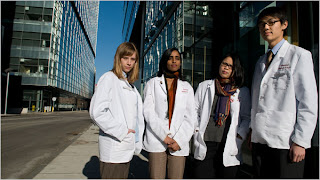
Two hundred Harvard Medical School students are confronting the school’s administration, demanding an end to pharmaceutical industry influence in the classroom.
The students worry that pharmaceutical industry scandals in recent years, including criminal convictions, billions of dollars in fines, proof of bias in research and publishing and false marketing claims, have cast a bad light on the medical profession. The students have criticized Harvard as being less vigilant than other leading medical schools in monitoring potential financial conflicts by faculty members.
Harvard received the lowest possible grade, an “F,” from the American Medical Student Association, a national group that rates how well medical schools monitor and control drug industry money.
The students were joined by Dr. Marcia Angell, a faculty member and former editor in chief of the New England Journal of Medicine, who has vigorously advocated for an end to liaisons between academia and Big Pharma. [Read more]
And from The New York Times, an article, "Harvard Medical School in Ethics Quandary" --
BOSTON — In a first-year pharmacology class at Harvard Medical School, Matt Zerden grew wary as the professor promoted the benefits of cholesterol drugs and seemed to belittle a student who asked about side effects.
Mr. Zerden later discovered something by searching online that he began sharing with his classmates. The professor was not only a full-time member of the Harvard Medical faculty, but a paid consultant to 10 drug companies, including five makers of cholesterol treatments.
“I felt really violated,” Mr. Zerden, now a fourth-year student, recently recalled. “Here we have 160 open minds trying to learn the basics in a protected space, and the information he was giving wasn’t as pure as I think it should be.”
Mr. Zerden’s minor stir four years ago has lately grown into a full-blown movement by more than 200 Harvard Medical School students and sympathetic faculty, intent on exposing and curtailing the industry influence in their classrooms and laboratories, as well as in Harvard’s 17 affiliated teaching hospitals and institutes. [Read More]
No comments:
Post a Comment